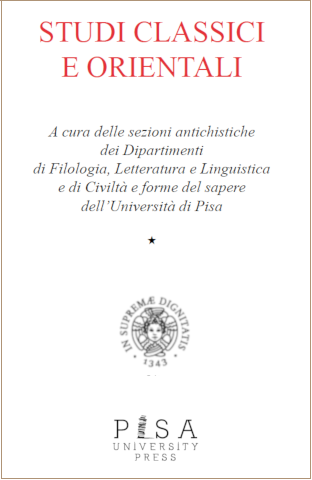THE GLORY OF THE SPEAR* - A POWERFUL SYMBOL IN HELLENISTIC POETRY AND ART. THE CASE OF NEOPTOLEMUS «OF TLOS» (AND OTHER PTOLEMAIC EPIGRAMS)
Abstract
Since Alexander the Great, the theme of the ‘spear-won land'(δορύκτητος χώρα) has been one of the most important in Hellenistic culture, since military victory is fundamental for the legitimation of the basileus, as the clearest sign of divine favor. The symbol of the spear, usually associated to Hellenistic kings both in court poetry and in the visual arts, represents the martial aspect of the ruler, but also of his ‘Friends', his closest administrative and military officials, who share the royal values and spread them in every country where the king, in a way or another, manifests his power.One of the best examples for the symbolic meaning of the spear is the anonymous epigram preserved by Stephanus of Byzantium s.v. Ἀγρίαι, composed to accompany an honorary statue of Neoptolemos,a Ptolemaic general who, on the occasion of a ‘barbarian' attack (probably around 260-250 BC), helped the city of Tlos, situated in a highly strategic position in the interior of Lycia. The poem
suggests that Neoptolemos is portrayed as a doryphoros, like the Lysippan Alexander praised by Plutarch and by some epigrammatists (cfr.Antiph. A.P. VI 97). The article offers a detailed discussion on the philological and historical problems of the epigram, investigates thoroughly the identity of Neoptolemos and the most likely
scenarios for his victory over Galatians, Pisidian, Agrianians and Peonians; in doing so, it offers also a survey of the political situation of Southern Anatolia in the third century BC, divided between the Seleucid and the Ptolemaic influence. The iconography of the ruler
aichmephoros, which after Lysippos enjoyed an extraordinary popularity in every Mediterranean country, is also discussed, with particular attention to the Anatolian variation on the subject (e.g. the strategos of the funerary relief in theMyra necropolis). The last section of the work investigates the presence of the spear symbol in epigrams referring to the Ptolemaic king's generals and philoi, but also private soldiers.
Pubblicato
2011-02-07
Fascicolo
Sezione
Articoli


